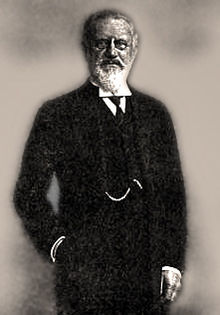Alexander Wyneken
Alexander Wyneken (born April 16, 1848 in Syke ; † April 5, 1939 in Königsberg ) was a German journalist and newspaper publisher . He became known in particular through his many years of activity as editor-in-chief and publisher of the national liberal Königsberger Allgemeine Zeitung .
Life
Wyneken was born as the son of the lawyer and later Hildesheim High Court President Friedrich Wyneken. In 1869 he passed the Abitur examination at the Georgianum Gymnasium (Lingen) . After completing a commercial apprenticeship, he first worked as a banker in Geneva , London and Petersburg .
Following his journalistic inclinations, he went to Breslau to the Schlesische Zeitung in the early 1870s and in 1875 switched to the local newspaper for Königsberg and the province of Prussia in Königsberg. Here he was initially the only editor . The newspaper was renamed Königsberger Allgemeine Zeitung in 1882 . At that time Wyneken was already editor-in-chief and publisher.
1925 awarded him the Law and Political Science Faculty of the University of Konigsberg , the honorary doctorate . In 1929 Wyneken retired from managing the newspaper. He was a member of the Königsberg Freemason Lodge Immanuel .
Act
Wyneken led the Königsberger Allgemeine Zeitung , which appeared for the first time on November 1, 1875, from a small provincial newspaper to the largest and most influential newspaper in East Prussia in the more than 50 years of its activity . The nationally liberal oriented newspaper was also one of the most important press votes in Prussia and in the Reich . When he left in 1929, the newspaper had almost 500 employees and a circulation of around 60,000. Her employees included u. a. the writers Walther Harich and Agnes Miegel and the composer Otto Besch . From 1897 to 1922, Alfred Kerr wrote a "Berlin chat letter" for the newspaper every Sunday.
Wyneken was a co-founder of the German People's Party (DVP) in East Prussia. His z. Private, confidential correspondence with significant contemporaries (e.g. with Ludendorff or Stresemann ) that has been handed down to us gives insights into their way of thinking.
literature
- Ruth Geede : From the Königsberger Allgemeine to the Preussische Allgemeine Zeitung: In a great tradition. Ostpreußenblatt, November 2, 2002, ISSN 0947-9597 .
- Hans-Rolf Wyneken: Popular and adored. The journalist Alexander Wyneken was born 150 years ago. Ostpreußenblatt, 1998, ISSN 0947-9597 .
Individual evidence
- ↑ Ludolf Gottschalk von dem Knesebeck: The truth about the propaganda campaign and Germany's collapse. Self-published, Munich 1927.
Web links
- Literature by and about Alexander Wyneken in the catalog of the German National Library
| personal data | |
|---|---|
| SURNAME | Wyneken, Alexander |
| BRIEF DESCRIPTION | German journalist and newspaper publisher |
| DATE OF BIRTH | April 16, 1848 |
| PLACE OF BIRTH | Syke |
| DATE OF DEATH | April 5, 1939 |
| Place of death | Koenigsberg |
